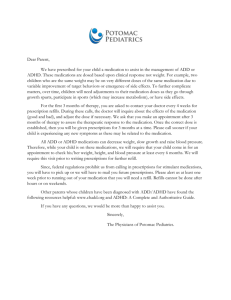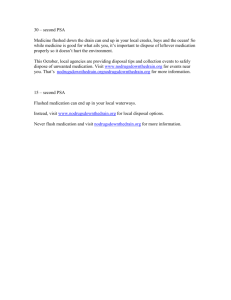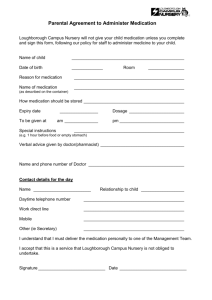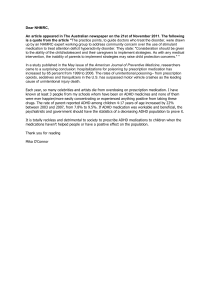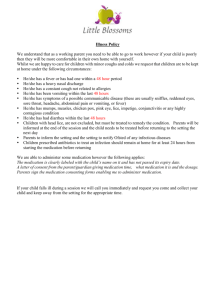General Tips - The Child & Adolescent Clinic
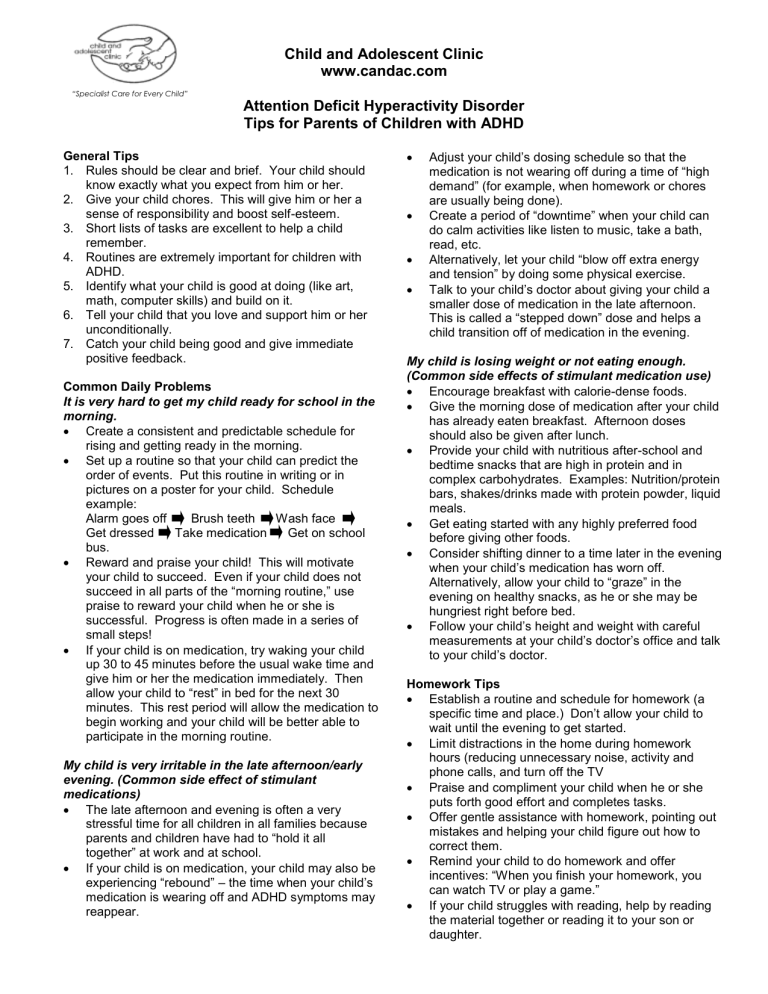
Child and Adolescent Clinic www.candac.com
“Specialist Care for Every Child”
General Tips
1. Rules should be clear and brief. Your child should know exactly what you expect from him or her.
2. Give your child chores. This will give him or her a sense of responsibility and boost self-esteem.
3. Short lists of tasks are excellent to help a child remember.
4. Routines are extremely important for children with
ADHD.
5. Identify what your child is good at doing (like art, math, computer skills) and build on it.
6. Tell your child that you love and support him or her unconditionally.
7. Catch your child being good and give immediate positive feedback.
Common Daily Problems
It is very hard to get my child ready for school in the morning.
Create a consistent and predictable schedule for rising and getting ready in the morning.
Set up a routine so that your child can predict the order of events. Put this routine in writing or in pictures on a poster for your child. Schedule example:
Alarm goes off Brush teeth Wash face
Get dressed Take medication Get on school bus.
Reward and praise your child! This will motivate your child to succeed. Even if your child does not succeed in all parts of the “morning routine,” use praise to reward your child when he or she is successful. Progress is often made in a series of small steps!
If your child is on medication, try waking your child up 30 to 45 minutes before the usual wake time and give him or her the medication immediately. Then allow your child to “rest” in bed for the next 30 minutes. This rest period will allow the medication to begin working and your child will be better able to participate in the morning routine.
My child is very irritable in the late afternoon/early evening. (Common side effect of stimulant medications)
The late afternoon and evening is often a very stressful time for all children in all families because parents and children have had to “hold it all together” at work and at school.
If your child is on medication, your child may also be experiencing “rebound” – the time when your child’s medication is wearing off and ADHD symptoms may reappear.
Attention Deficit Hyperactivity Disorder
Tips for Parents of Children with ADHD
Adjust your child’s dosing schedule so that the medication is not wearing off during a time of “high demand” (for example, when homework or chores are usually being done).
Create a period of “downtime” when your child can do calm activities like listen to music, take a bath, read, etc.
Alternatively, let your child “blow off extra energy and tensio n” by doing some physical exercise.
Talk to your child’s doctor about giving your child a smaller dose of medication in the late afternoon.
This is called a “stepped down” dose and helps a child transition off of medication in the evening.
My child is losing weight or not eating enough.
(Common side effects of stimulant medication use)
Encourage breakfast with calorie-dense foods.
Give the morning dose of medication after your child has already eaten breakfast. Afternoon doses should also be given after lunch.
Provide your child with nutritious after-school and bedtime snacks that are high in protein and in complex carbohydrates. Examples: Nutrition/protein bars, shakes/drinks made with protein powder, liquid meals.
Get eating started with any highly preferred food before giving other foods.
Consider shifting dinner to a time later in the evening when your child’s medication has worn off.
Alternatively, allow your child to “graze” in the evening on healthy snacks, as he or she may be hungriest right before bed.
Follow your child’s height and weight with careful measurements at your child’s doctor’s office and talk to your child’s doctor.
Homework Tips
Establish a routine and schedule for homework (a specific time and place.) Don’t allow your child to wait until the evening to get started.
Limit distractions in the home during homework hours (reducing unnecessary noise, activity and phone calls, and turn off the TV
Praise and compliment your child when he or she puts forth good effort and completes tasks.
Offer gentle assistance with homework, pointing out mistakes and helping your child figure out how to correct them.
Remind your child to do homework and offer incentives: “When you finish your homework, you can watch TV or play a game.”
If your child struggles with reading, help by reading the material together or reading it to your son or daughter.
Work a certain amount of time and then stop working on homework. Many parents find it very difficult to help their own child with schoolwork. Find someone who can. Consider hiring a tutor! Often a junior or senior high school student is ideal, depending on the need and age of your child.
Discipline
Be firm. Set rules and stick to them.
Make sure your child understands the rules, so he or she does not feel uninformed.
Use positive reinforcement. Praise and reward your child for good behavior.
Change or rotate rewards frequently to maintain a high interest level.
Punish behavior, not the child. If your child misbehaves, try alternatives like allowing natural consequences, withdrawing yourself from the conflict, or giving your child a choice.
Taking Care of Yourself
Come to terms with your child’s challenges and strengths.
Seek support from family and friends or professional help such as counseling or support groups.
Help other family members recognize and understand ADHD.

